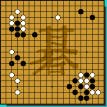


ChessBase 17 - Mega package - Edition 2024
It is the program of choice for anyone who loves the game and wants to know more about it. Start your personal success story with ChessBase and enjoy the game even more.
Editorial commentary by the ChessBase staff is given in red italics.
Early in the film "A Beautiful Mind," the mathematician John Nash is seen sitting in a Princeton courtyard, hunched over a playing board covered with small black and white pieces that look like pebbles. He was playing Go, an ancient Asian game. Frustration at losing that game inspired the real Mr. Nash to pursue the mathematics of game theory, research for which he eventually won a Nobel Prize.
In recent years, computer experts, particularly those specializing in artificial intelligence, have felt the same fascination — and frustration.
Programming other board games has been a relative snap. Even chess has succumbed to the power of the processor. Five years ago, a chess-playing computer called Deep Blue not only beat but thoroughly humbled Garry Kasparov, the world champion at the time. That is because chess, while highly complex, can be reduced to a matter of brute force computation.
Kasparov was not "thoroughly humbled" by the machine: He won the first match in 1996 and lost the second in 1997, narrowly while dominating the machine in most games. The overall score in the twelve games between the two is +4, =5, –3, which adds up to 5.5-4.5 for Kasparov.
Go is different. Deceptively easy to learn, either for a computer or a human, it is a game of such depth and complexity that it can take years for a person to become a strong player. To date, no computer has been able to achieve a skill level beyond that of the casual player.
Programmers working on Go see it as more accurate than chess in reflecting the ineffable ways in which the human mind works. The challenge of programming a computer to mimic that process goes to the core of artificial intelligence, which involves the study of learning and decision-making, strategic thinking, knowledge representation, pattern recognition and, perhaps most intriguingly, intuition.
Today's computers do not try to mimic the processes of the human mind. They always do "brute force computation". At the same time the may display behavior which is practically indistinguishable from human activity that is driven by "learning, decision-making, strategic thinking, knowledge representation, pattern recognition and intuition". Prime examples are Fritz, Junior, Shredder, Hiarcs, Tiger and other members of that crowd.
"A good Go player could make a move and other players say, `Yes, that's a good move,' but they can't explain to you why it's a good move, or how they even know it's a good move," said Dr. John McCarthy, a professor emeritus at Stanford University and a pioneer in artificial intelligence.
Dr. Danny Hillis, a computer designer and chairman of the technology company Applied Minds, said that the depth of Go made it ripe for the kind of scientific progress that comes from studying one example in great detail. "We want the equivalent of a fruit fly to study," Dr. Hillis said. "Chess was the fruit fly for studying logic. Go may be the fruit fly for studying intuition."
It is possible that programming Go will lead to breakthroughs in simulating human pattern recognition and intuition. We believe that it is far more likely that a number-crunching brute force solution will be found first. Chess went through exactly the same process.
David Fotland, [a programmer and chip designer in San Jose, Calif., who created and sells The Many Faces of Go, one of the few commercial Go programs,] said, "writing a strong Go program will teach us more about making computers think like people than writing a strong chess program."
With over a hundred teams programming chess during the last fifty years one would have expected results in this area than in the relative new endeavor of programming a computer to play Go. Although chess certainly requires learning, decision-making, strategic thinking, knowledge representation, pattern recognition and intuition when it is played by human beings, none of this turned out to be practically feasible in a computer program. It would be quite remarkable if the breakthrough comes in an area which is much less well understood than chess.
Dr. Reiss, [a computer scientist in London] who works on Go full time, said "I think in the long run the only way to write a strong Go program is to have it learn from its own mistakes, which is classic A.I., and no one knows how to do that yet," Mr. Fotland said. A few programs have some learning capabilities built into them.
Dr. Reiss said he had come up with an idea for a new Go program that would learn by analyzing professional games. But to pursue his idea would require too much work, he said, depriving him of time to continue making updates to his current program.
We have seen exactly this happen in numerous computer chess projects. The developers have explored the possibility of human decision making, pattern recognition and intuition, only to come up with a traditional brute force program in the end, one which only crunches numbers but at the same time displays behavior that in humans requires pattern recognition and intuition.
It seems unlikely that a computer will be programmed to drub a strong human player any time soon, Dr. Reiss said. "But it's possible to make an interesting amount of progress, and the problem stays interesting," he said. "I imagine it will be a juicy problem that people talk about for many decades to come."
If you have an opinion on the subject please feel free to contact us.